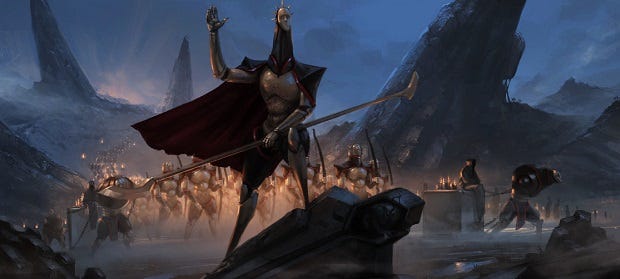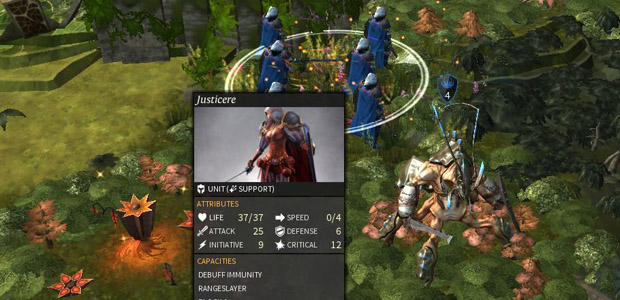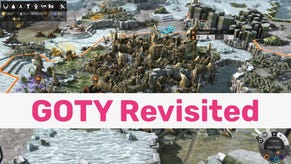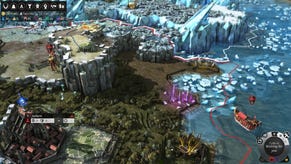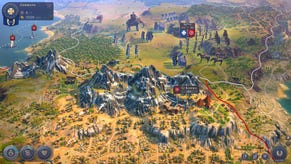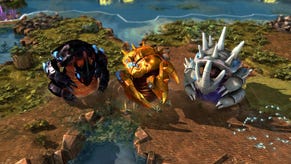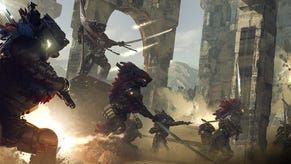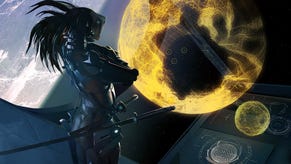Wot I Think: Endless Legend
Infinite Feat
A cursory glance might lead you to believe that Endless Legend is a duck. In this instance, Civilization V is the Platonic ideal of the duck and that brief glimpse of Endless Legend shaking its tailfeather might be enough to convince you that it looks like a duck, swims like a duck and quacks like a duck. Closer investigation reveals something altogether different though. Sure, it has feathers and you're likely to find it paddling around and flashing its bum at the world while it grabs something to eat, but Endless Legend might be best thought of as a swan in a pond full of ducks.
Either that or it's Howard the Duck. Here's wot I think.
Like Amplitude's other current project Dungeon of the Endless, which mashes tower defence and roguelike dungeon crawling together to create something unusual and difficult to get a hold on, Endless Legend recalibrates familiar elements to create something at odds with prior learning. It's a game about settling, conquering and researching, but its factions have unique rulesets that are strong and diverse enough to change the entire structure of a campaign. It's a game about taming a fantasy world, by painting it in your empire's colour, but it's also about the entropy of that world as it approaches a wintry twilight.
Few things work precisely as you'd expect them to, bringing in the baggage of previous turn-based strategy experience, but the slickness of the interface helps to smooth out the assimilation of new information. In the slow burn of the first turns of any campaign, a few things become apparent. Combat, usually against a minor faction in the early stages, is an unusual take on the tactical maps of Master of Magic.
Rather than zooming into a separate space as units go toe-to-toe, Endless Legend separates armies into their constituent parts right there on the strategic map. Attack a stack of five units with four of your own and every individual unit on each side leaves the main army block and takes up position in the world. That allows for some flexibility in positioning ranged units and the like, and concentrating attacks on specific units, but even after days of playing, it feels slightly uncomfortable. I'm accustomed to ignoring issues of scale when I watch stacks of troops moving across this kind of terrain and some preconditioning, I suppose, is harder to break.
Combat can be automated - and the victory is usually in the preparation rather than the event itself - and the criticism isn't particularly significant. There's far too many pleasures to be had in the games other branches to worry about a slight confusion in battlefield efficiency. Exploration is always delightful and the map of each randomised (and customisable) world transitions as beautifully as anything I've seen in the genre. It's possible to zoom in for a close up study of the gloriously bizarre resources and locations, and to nudge the scrollwheel and see increasingly abstract icons overlaid as the finer detail fades.
In a blow to convention, maps are strictly divided into regions, each of which can contain just the one city at any one time. There may be minor faction settlements but the major empires, players included, can't find a fertile region and dump six cities side by side inside it. This cuts down on micromanagement to an extent but its primary purpose is to make each city an important investment. Rather than simply building improvements within them, you'll be expanding them across the map, and different shapes and sizes of expansion have different pros and cons.
New districts increase unrest but can be levelled up to create benefits that outweigh that drain. In order to access the best bonuses you'll have to plan ahead, however, considering both the position and function of each new district. It's a far more involved and credible city building process than I've grown to expect - not just a list of buildings but an actual design. Like many things in the game, it's initially distracting and might even seem like busywork without definite purpose, but it's the quiet core of every campaign.
Or perhaps not. Perhaps the factions really are at the heart of everything. They don't just have a unique unit or some manner of research or productivity bonus, they each have a (well) written narrative, which provides unique functions, quests and heroes. There's a light RPG touch in the management of heroes, who have many tiers of equipment to discover, but it doesn't take precedence over empire management, as can be the case in Elemental.
The factions are the true heroes. Whether it's the corpse-devouring insectoid Necrophages or the Cultists, who work from a single city and rely heavily on manipulation of minor factions. My personal favourites are The Roving Clans, a nomadic outfit who can relocate their cities by means of giant scarab beetles. Their modus operandi when it comes to conquest involves mercenaries and diplomatic wrangling, as they can't openly declare war. That's big rule change and they've got the portable scarab cities AS WELL. What more do you want from a faction, eh?
Tech tree changes aren't Endless Legend's final trick - in a very real sense, the final trick is the seasonal variance and approaching apocalypse - but they deserve mention. Amplitude have chopped the trees down and replaced them with tech pools. There's progression through eras of tech but each stage has a group of choices but they're free of links and prerequisites. You can pick whatever's suitable for your current situation or queue up a long-term research plan.
All of these elements combine to make a game that feels like it has emerged from a slightly different timeline. It's similair to the things you know but almost everything is either redesigned or rearranged. There's a quote I've seen attributed to Brian Eno - "great pop music made by small groups of people misunderstanding other small groups far away" - and it almost fits here. Amplitude feel like they've perfectly understood those other small groups but have decided to do plug in their own synths and pedals anyway.
It's taken me longer to assemble my thoughts than I expected. I feel like saying too much would spoil Endless Legend and I can't think of the last time I worried about spoilers in a 4x strategy game. There's so much to discover though and the joy, as so often, is in that discovery and the learning process that comes afterwards.
All of the changes combine to make a game that is more concentrated than the usual Civ style strategy. There are still stretches in which turn after turn ends with little to do, but success is tied up in forming long-term strategies rather than following a process through to its end-point. There are decisions to make moment to moment as well, sometimes as simple as shifting worker priorities and sometimes as grand as eliminating a faction from existence.
Is it a swan or is it Howard the Duck then? It's as handsome as the former and, in its own quiet way, as unusual as the latter. More than anything, it's a fine marker of intent from Amplitude, who have been quietly tinkering with the fundamental mechanics and world-building of strategy since Endless Space's arrival. Legend feels like an experiment, and it's a supremely confident and engaging one that doesn't quite fit pre-existing templates. It's a 4x game, sure, but it's a not a high or low fantasy one. It's weird fantasy and the weird cuts through to the playstyles as well as the art and fiction.
Endless Legend is out now.
